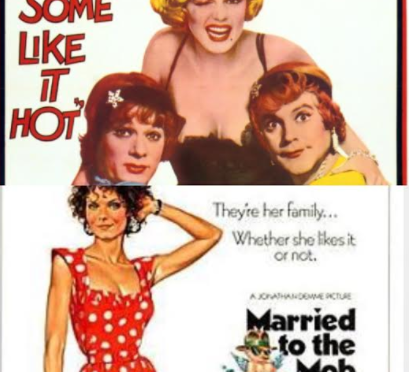With Swing Shift and Something Wild, director Jonathan Demme established himself as a comedic force to be reckoned with in the 80s, much of his style being likenable to Billy Wilder’s best screwball comedies, Some Like It Hot included. Like Wilder, Demme has also shown his knack for drama with such quintessentials as The Silence of the Lambs and Philadelphia. But it was with 1988’s Married to the Mob that Demme came closest to emulating the distinct style of Wilder.
With the mob playing heavily into the plotlines of both comedies, Some Like It Hot opens with deadbeat saxophone player, Joe (Tony Curtis), and his best friend and fellow musician, Jerry (Jack Lemmon), fleeing from a raid by the police on the gangster-run club they play music in. In Married to the Mob, the opening sequence is a bit less dramatic (unless you count the fact that Rosemary Clooney’s “Mambo Italiano” is playing), with our introduction to the protagonist built up to via conversations between her husband, Frank de Marco (Alec Baldwin), and another lower-level mafioso taking a hit out on someone on the LIRR. Expressing that his wife, Angela (Michelle Pfeiffer), has been acting strangely of late, Frank insists that he’s got to talk to her about her behavior. Indeed, Angela shows an extreme hesitation to be involved with the mafia lifestyle, snubbing the other wives’ invites and “friendliness” at the hair salon; her timidity often mirrors that of Jerry’s, who wants no part of Joe’s sleazy antics. Meanwhile, the head of the Long Island family, Tony “The Tiger” Russo (Dean Stockwell), has called a meeting at a Medieval Times sort of joint to discuss potential promotions. It’s there we see him canoodling with his mistress, Karen (Nancy Travis), one of the shtickily dressed employees. After meeting him at a hotel nearby, Tony confirms the suspicion that Karen is two-timing him with Frank by lingering around and waiting for him to show up, offing both of them without a second thought once his theory about their affair is confirmed.
Now that Frank is dead, Angela mistakenly believes she might have a rare opportunity to escape the clutches of the mafia–just as Joe and Jerry think they can by fleeing from Chicago after witnessing a mafia massacre. Alas, Tony takes a shine to her at Frank’s funeral, putting the moves on her at his wake as FBI agents Mike Downey (Matthew Modine) and Ed Benitez (Oliver Platt, who I guess could pass for being of Hispanic descent back in the 80s) observe and take photos from afar. Determined to get out of “the family” and make it in New York City with her son on her own, Angela quietly sells everything and drives off just as Tony’s wife, Connie (Mercedes Ruehl), sees her leaving.
Joe and Jerry, too, must leave quietly for Miami, disguising themselves as women to make it more difficult to be found by the head of the clan that’s after them, Spats Colombo (George Raft). Ultimately, Miami proves to be a haven for everyone, as Angela also finds herself heading down there after falling for Mike under the assumption he’s just a regular guy living in her dilapidated Lower East Side building. When she unearths the truth, however, she decides–after a bit of enragement–to help him catch Tony once and for all by pretending to reciprocate his interest in her. Thus, she accompanies him to have a sit-down with another mafia leader (again, mirroring the events of Some Like It Hot at the “Friends of Italian Opera” gathering) in that scary place called Florida.
Unfortunately for Tony, Connie, the most jealous of all wives, finds out that he’s booked the honeymoon suite for him and someone else. Knowing full well that it’s Angela he’s taken with him instead of her, she grabs her own flight down to Miami where a showdown between all involved takes place. And, yes, similarly, the denouement of Some Like It Hot occurs in a posh Miami hotel as well.
Just as with Some Like It Hot, love doesn’t truly blossom until the lead characters leave their natural environment and mistaken or masked identities are finally unveiled. Though, of course, it is the masked identity that initially catches Angela and Sugar Kane’s (Marilyn Monroe) interest in each film. And, of course, at the center of the plot is a love triangle driven by a beautiful, somewhat oblivious woman with a lot of mafia-based chaos swirling around her that she wants no part of.
Because the 80s saw such a resurgence in the screwball comedy genre (see: Desperately Seeking Susan, Overboard and Who’s That Girl), it’s no wonder that Demme would cull some inspiration, whether unwitting or not, from one of the consummate masters of the style. The result is one of the most memorable comedies of the era, though probably nothing will ever hold a candle to Tootsie, which also favors deception through disguise. Come to think of it, the 80s were very Shakespearean in this regard.




















